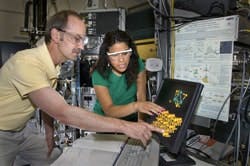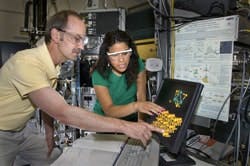Instrument Promises Better Catalysts
Production of nanocatalysts that provide improved performance for removing sulfur from natural gas and petroleum products may be possible due to a new instrument that permits control of the size of nanoclusters with atomic precision, say researchers at the U.S. Department of Energy’s Brookhaven National Laboratory, Upton, N.Y. Molybdenum sulfide nanoparticles already serve as catalysts for desulfurization but the impact of differences in particle size and composition isn’t clearly understood, they explain. The instrument will enable exploring how the current catalysts work and so will provide insights for the design of the next generation of catalysts, notes Michael White, a chemist at the lab.Figure 1

